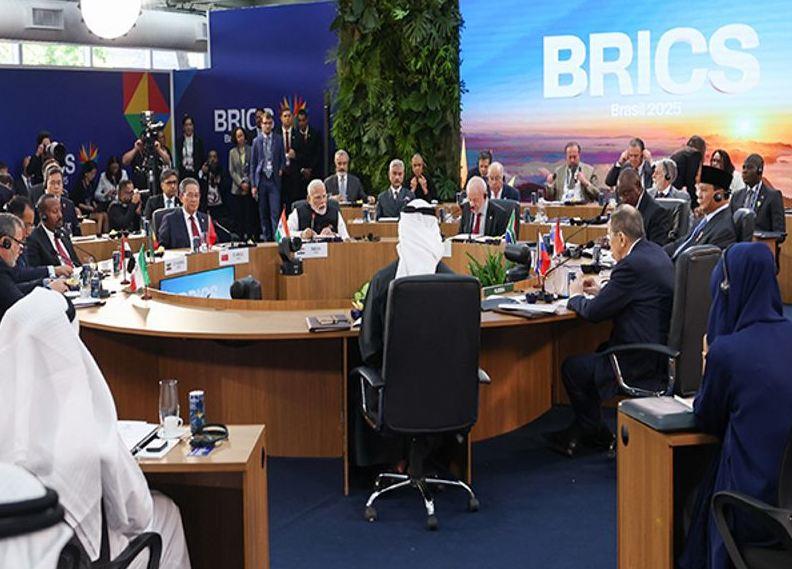BRICS calls for urgent UNSC reform, reiterate support for India, Brazil to play greater role in UN

Jul 07, 2025
Leaders of BRICS nations reiterated support for "comprehensive reform" of the United Nations, including its Security Council, for making it more democratic, representative, effective and efficient.
In a joint declaration at the 17th BRICS summit in Rio de Janeiro, China and Russia, as permanent members of the United Nations Security Council, reiterated their support for the aspirations of Brazil and India to play a greater role in the UN, including its Security Council.
The joint declaration stated, "Recognizing the 2023 Johannesburg-II Leaders' Declaration, we reiterate our support for a comprehensive reform of the United Nations, including its Security Council, with a view to making it more democratic, representative, effective and efficient, and to increase the representation of developing countries in the Council's memberships so that it can adequately respond to prevailing global challenges and support the legitimate aspirations of emerging and developing countries from Africa, Asia and Latin America, including BRICS countries, to play a greater role in international affairs, in particular in the United Nations, including its Security Council. We recognize the legitimate aspirations of African countries, as reflected in the Ezulwini Consensus and Sirte Declaration."
"We stress that the United Nations Security Council reform is to lead to the amplified voice of the Global South. Recalling the 2022 Beijing and 2023 Johannesburg-II Leaders' Declarations, China and Russia, as permanent members of the United Nations Security Council, reiterate their support to the aspirations of Brazil and India to play a greater role
in the United Nations, including its Security Council," it added.
Notably, India has long sought a permanent seat in the UN Security Council (UNSC) to better represent the interests of the developing world. The UNSC is composed of 15 member states, including five permanent members with veto power and ten non-permanent members elected for two-year terms.
In the joint declaration, the leaders of the BRICS nations expressed serious concerns about the rise of unilateral tariffs and non-tariff measures, which distort trade and are inconsistent with World Trade Organization (WTO) rules. They reiterated their support for the rules-based, open, transparent, fair, inclusive, equitable, non-discriminatory, consensus-based multilateral trading system with the WTO at its core, with special and differential treatment (S&DT) for its developing members.
The joint declaration stated, "The multilateral trading system has long been at a crossroads. The proliferation of trade-restrictive actions, whether in the form of indiscriminate rising of tariffs and nontariff measures, or protectionism under the guise of environmental objectives, threatens to further reduce global trade, disrupt global supply chains, and introduce uncertainty into international economic and trade activities, potentially exacerbating existing economic disparities and affecting prospects for global economic development. We voice serious concerns about the rise of unilateral tariff and non-tariff measures which distort trade and are inconsistent with WTO rules."
"In this context, we reiterate our support for the rulesbased, open, transparent, fair, inclusive, equitable, non-discriminatory, consensus-based multilateral trading system with the World Trade Organization (WTO) at its core, with special and differential treatment (S&DT) for its developing members. We emphasize that the WTO, at its 30th anniversary, remains the only multilateral institution with the necessary mandate, expertise, universal reach and capacity to lead on the multiple dimensions of international trade discussions, including the negotiation of new trade rules," it added.
The leaders of BRICS nations recalled the commitment made at the 12th WTO Ministerial Conference and reaffirmed at the 13th WTO Ministerial Conference to work towards a necessary reform of the Organization to ensure its relevance and restore the credibility of the multilateral trading system.
They expressed commitment to the urgent restoration of an accessible, effective, fully-functioning, two-tier binding WTO dispute settlement system. They expressed support for Ethiopia and Iran's bid for accession to the WTO. They welcomed the BRICS Declaration on WTO Reform and Strengthening of the Multilateral Trading System, adopted by the Ministers of Trade.
The joint declaration stated, "We condemn the imposition of unilateral coercive measures that are contrary to international law, and reiterate that such measures, inter alia in the form of unilateral economic sanctions and secondary sanctions, have far-reaching negative implications for the human rights, including the rights to development, health and food security, of the general population of targeted states, disproportionally affecting the poor and people in vulnerable situations, deepening the digital divide and exacerbating environmental challenges."
"We call for the elimination of such unlawful measures, which undermine international law and the principles and purposes of the UN Charter. We reaffirm that BRICS member states do not impose or support non-UN Security Council authorized sanctions that are contrary to international law," it added.
Leaders of BRICS nations also expressed concern about ongoing conflicts in many parts of the world and the current state of polarisation and fragmentation in the international order. They expressed alarm at the current trend, which has seen a critical increase in global military spending to the detriment of adequate financing for development in developing countries. They advocated for a multilateral approach that respects diverse national viewpoints and positions on crucial global issues, including sustainable development, the eradication of hunger and poverty and contributing to the global response to climate change, while expressing deep concern over attempts to link security with the climate change agenda.
The joint declaration statement stated, "We note the current global context of polarization and distrust and encourage global action to strengthen international peace and security. We call on the international community to respond to these challenges and associated security threats through politico-diplomatic measures to lower conflict potential and stress the need to engage in conflict prevention efforts, including through addressing their root causes."
The BRICS summit, hosted by Brazil, brought together leaders from Brazil, Russia, India, China, and South Africa, as well as new members Egypt, Ethiopia, Iran, the UAE, and Indonesia. Brazil assumed the BRICS Chairship on January 1, 2025, with the theme 'Strengthening Global South Cooperation for More Inclusive and Sustainable Governance'.